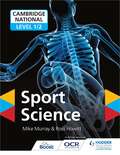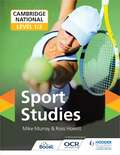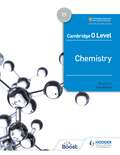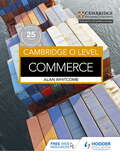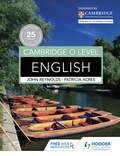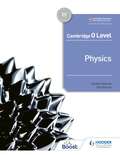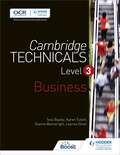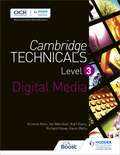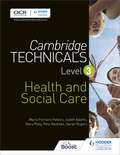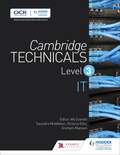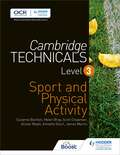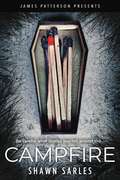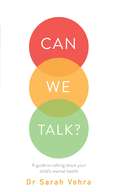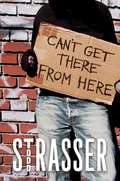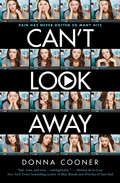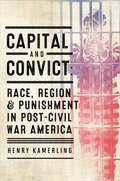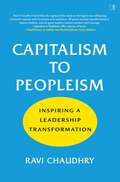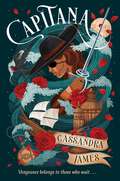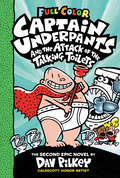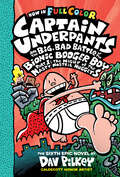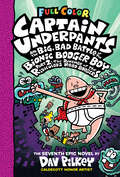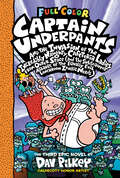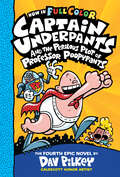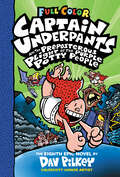- Table View
- List View
Cambridge National Level 1/2 Sport Science
by Mike Murray Ross HowittReinforce classroom learning and strengthen your students' understanding of the content with this Student Book written for the Cambridge National Level 1 / 2 in Sport Science.Covering the two mandatory units and all of the optional units, this essential student book will help to build students' knowledge and develop the skills required for success in Sport Science.- This reliable and accessible textbook is structured to match the specification and provide your students with all the information they need, giving them the opportunity to build skills through appropriate activities.- Builds students' skillsets with clearly-focused content to aid progression and questions to assess understanding.- Prepares your students for both the internal and external assessment with opportunities to test and consolidate understanding.
Cambridge National Level 1/2 Sport Studies
by Mike Murray Ross HowittReinforce classroom learning and strengthen your students' understanding of the content with this Student Book written for the Cambridge National Level 1 / 2 in Sport Studies.Covering the two mandatory units and all of the optional units, this essential student book will help to build students' knowledge and develop the skills required for success in Sport Studies.- This reliable and accessible textbook is structured to match the specification and provide your students with all the information they need, giving them the opportunity to build skills through appropriate activities.- Builds students' skillsets with clearly-focused content to aid progression and questions to assess understanding.- Prepares your students for both the internal and external assessment with opportunities to test and consolidate understanding.
Cambridge O Level Chemistry
by Bryan Earl Doug WilfordWritten by renowned expert authors, our updated resources enable the learner to effectively navigate through the content of the revised Cambridge Chemistry (5070) syllabus for examination from 2023.- Develop strong practical skills: practical skills features provide guidance on key experiments, interpreting experimental data, and evaluating results; supported by practice questions for preparation for practical exams or alternatives.- Build mathematical skills: worked examples demonstrate the key mathematical skills in scientific contexts; supported by follow-up questions to put these skills into practice.- Consolidate skills and check understanding: self-assessment questions, exam-style questions and checklists are embedded throughout the book, alongside key definitions of technical terms and a Glossary.- Navigate the syllabus confidently: content flagged clearly with introductions to each topic outlining the learning objectives and context. - Deepen and enhance scientific knowledge: going further boxes throughout encourage students to take learning to the next level.
Cambridge O Level Commerce
by Alan WhitcombWe are working with Cambridge International Examinations to gain endorsement for this new, full-colour textbook matched exactly to the syllabus.- Matched exactly to the latest Cambridge O level syllabus- Data-based structured questions and multiple choice questions at the end of every chapter- Student activities throughout
Cambridge O Level English
by John Reynolds Patricia AcresWe are working with Cambridge International Examinations to gain endorsement for this title.A full-colour textbook from expert authors and teachers that is matched exactly to the latest syllabus. Each unit focuses on a genre and includes both writing and reading tasks.
Cambridge O Level Physics
by Tom Duncan Heather KennettThis title is endorsed by Cambridge Assessment International Education to support the full syllabus for examination from 2023.Written by renowned expert authors, our updated resources enable the learner to effectively navigate through the content of the revised Cambridge O Level Physics (5054) syllabus for examination from 2023.- Develop strong practical skills: practical skills features provide guidance on key experiments, interpreting experimental data, and evaluating results; supported by practice questions for preparation for practical exams or alternatives.- Build mathematical skills: worked examples demonstrate the key mathematical skills in scientific contexts; supported by follow-up questions to put these skills into practice.- Consolidate skills and check understanding: self-assessment questions, exam-style questions and checklists are embedded throughout the book, alongside key definitions of technical terms and a Glossary.- Navigate the syllabus confidently: content flagged clearly with introductions to each topic outlining the learning objectives and context. - Deepen and enhance scientific knowledge: going further boxes throughout encourage students to take learning to the next level.
Cambridge Technicals Level 3 Business
by Karen Tullett Tess Bayley Leanna OliverSupport your teaching of the new Cambridge Technicals 2016 suite with Cambridge Technical Level 3 Business, developed in partnership between OCR and Hodder Education; this textbook covers each specialist pathway and ensures your ability to deliver a flexible course that is both vocationally focused and academically thorough.Cambridge Technical Level 3 Business is matched exactly to the new specification and follows specialist pathways in human resources, marketing, accounting and business planning.- Ensures effective teaching of each specialist pathway offered within the qualification.- Focuses learning on the skills, knowledge and understanding demanded from employers and universities.- Provides ideas and exercises for the application of practical skills and knowledge.- Developed in partnership between Hodder Education and OCR, guaranteeing quality resources which match the specification perfectly
Cambridge Technicals Level 3 Digital Media
by Karl Davis Richard Howe Victoria AllenSupport your teaching of the new Cambridge Technicals 2016 suite with Cambridge Technical Level 3 Digital Media, developed in partnership between OCR and Hodder Education; this textbook covers each specialist pathway and ensures your ability to deliver a flexible course that is both vocationally focused and academically thorough.Cambridge Technical Level 3 Digital Media is matched exactly to the new specification and follows specialist pathways in digital content for interactive media, and moving image and audio production.- Ensures effective teaching of each specialist pathway offered within the qualification.- Focuses learning on the skills, knowledge and understanding demanded from employers and universities.- Provides ideas and exercises for the application of practical skills and knowledge.- Developed in partnership between Hodder Education and OCR, guaranteeing quality resources which match the specification perfectly
Cambridge Technicals Level 3 Health and Social Care
by Maria Ferreiro Peteiro Mary Riley Judith AdamsSupport your teaching of the new Cambridge Technicals 2016 suite with Cambridge Technical Level 3 Health & Social Care, developed in partnership between OCR and Hodder Education; this textbook covers each specialist pathway and ensures your ability to deliver a flexible course that is both vocationally focused and academically thorough.Cambridge Technical Level 3 Health & Social Care is matched exactly to the new specification and follows specialist pathways in health science, social care and support, and working with children and young people.- Ensures effective teaching of each specialist pathway offered within the qualification.- Focuses learning on the skills, knowledge and understanding demanded from employers and universities.- Provides ideas and exercises for the application of practical skills and knowledge.- Developed in partnership between Hodder Education and OCR, guaranteeing quality resources which match the specification perfectly
Cambridge Technicals Level 3 IT
by Victoria Ellis Graham Manson Saundra MiddletonExam Board: CambridgeLevel: KS4Subject: ITFirst Teaching: September 2016First Exam: June 207Support your teaching of the new Cambridge Technicals 2016 suite with Cambridge Technical Level 3 IT, developed in partnership between OCR and Hodder Education; this textbook covers each specialist pathway and ensures your ability to deliver a flexible course that is both vocationally focused and academically thorough.Cambridge Technical Level 3 IT is matched exactly to the new specification and follows specialist pathways in IT Infrastructure Technician, Emerging Digital Technology Practitioner, Application Developer, and Data Analyst.- Ensures effective teaching of each specialist pathway offered within the qualification.- Focuses learning on the skills, knowledge and understanding demanded from employers and universities.- Provides ideas and exercises for the application of practical skills and knowledge.- Developed in partnership between Hodder Education and OCR, guaranteeing quality resources which match the specification perfectly
Cambridge Technicals Level 3 Sport and Physical Activity
by Scott Chapman Alister Myatt Helen BraySupport your teaching of the new Cambridge Technicals 2016 suite with Cambridge Technical Level 3 Sport, developed in partnership between OCR and Hodder Education; this textbook covers each specialist pathway and ensures your ability to deliver a flexible course that is both vocationally focused and academically thorough.Cambridge Technical Level 3 Sport is matched exactly to the new specification and follows specialist pathways in n coaching, leadership and physical education, fitness instructing, personal training, and sports management, development and leisure.- Ensures effective teaching of each specialist pathway offered within the qualification.- Focuses learning on the skills, knowledge and understanding demanded from employers and universities.- Provides ideas and exercises for the application of practical skills and knowledge.- Developed in partnership between Hodder Education and OCR, guaranteeing quality resources which match the specification perfectly
Campfire
by James Patterson Shawn SarlesBe careful what stories you tell around the campfire... they just might come true. Fans of Scream and Miss Peregrine's Home for Peculiar Children will devour this chilling horror debut.While camping in a remote location, Maddie Davenport gathers around the fire with her friends and family to tell scary stories. Caleb, the handsome young guide, shares the local legend of the ferocious Mountain Men who hunt unsuspecting campers and leave their mark by carving grisly antlers into their victims' foreheads.The next day, the story comes true. Now Maddie and her family are lost in the deep woods--with no way out--being stalked by their worst nightmares. Because there were other, more horrifying stories told that night--and Maddie's about to find out just how they end...
Can We Talk?: About Mental Health in Children and Young People
by Sarah Vohra'Parental anxiety is natural, but if you think something's wrong - trust your instincts. Talk to your child and seek professional help sooner, rather than later'. - Dr Sarah VohraHow do you know what to worry about - and what not to worry about?How do you keep the lines of communication open?When - and how - should you seek professional help?In Can We Talk? consultant child psychiatrist Dr Sarah Vohra shares an easy-to-use traffic light system that will help you to navigate tricky early conversations. Whether your child is 6 or 16, the expert advice and practical tools in this book cover such key concerns as sleep, low mood, anxiety and self-harm. This updated edition also includes a new chapter on the impact of social media on your child's wellbeing, with strategies to help you support them in a world where Instagram and Snapchat multiply the pressure to be perfect at all levels and all times.Whether your child is a preschooler or a teenager, this is an invaluable resource for anyone worried about a young person's mental health.
Can't Get There from Here
by Todd StrasserHer street name is MaybeShe lives with a tribe of homeless teens -- runaways and throwaways, kids who have no place to go other than the cold city streets, and no family except for one another. Abused, abandoned, and forgotten, they struggle against the cold, hunger, and constant danger.With the frigid winds of January comes a new girl: Tears, a twelve-year-old whose mother doesn't believe her stepfather abuses her. As the other kids start to disappear -- victims of violence, addiction, and exposure -- Maybe tries to help Tears get off the streets...if it's not already too late.Todd Strasser, author of the powerful and disturbing Give a Boy a Gun, again focuses on an important social issue as he tells a thought-provoking, heart-wrenching story of young lives lost to the streets, and of a society that has forgotten how to care.
Can't Look Away (Point Ser.)
by Donna CoonerDonna Cooner establishes herself as our own Jodi Picoult in this timely tale of sisters, loss, and redemption.Torrey Grey is famous. At least, on the internet. Thousands of people watch her popular videos on fashion and beauty. But when Torrey's sister is killed in an accident -- maybe because of Torrey and her videos -- Torrey's perfect world implodes. Now, strangers online are bashing Torrey. And at her new school, she doesn't know who to trust. Is queen bee Blair only being sweet because of Torrey's internet infamy? What about Raylene, who is decidedly unpopular, but seems accepts Torrey for who she is? And then there's Luis, with his brooding dark eyes, whose family runs the local funeral home. Torrey finds herself drawn to Luis, and his fascinating stories about El Dia de los Muertos, the Day of the Dead. As the Day of the Dead draws near, Torrey will have to really look at her own feelings about death, and life, and everything in between. Can she learn to mourn her sister out of the public eye?
Cancelled
by Farrah PennWith its clever snark and searing perspective, Cancelled is a funny, fearless novel about the realistic pitfalls and unforgettable moments high school has to offer, perfect for fans of Jenny Han and Emma Lord.Not to brag, but Brynn Whittaker is basically killing her senior year. She's got the looks, the grades, and a thriving "flirt coach" business that will help pay for her ultimate dream school: Stanford University. But when a highly incriminating video goes viral after the first rager of the year, Brynn finds herself at the center of a school-wide scandal of catastrophic proportions. She knows she's not the girl in the video hooking up with her former best friend's boyfriend (While wearing a banana costume, no less. Hey, points for style), but adding that to her reputation of being a serial dater, she quickly starts losing friends and customers. On top of that, the scorn she receives exposes the culture of misogyny that is rampant at her school . . . and Brynn and her three best friends are determined to take down all the haters. But as she gets closer to identifying the person in the video that got her cancelled, Brynn must decide—is exposing the girl worth losing everything she's worked so hard for?This witty, unapologetic novel by Farrah Penn boldly tackles the problematic double standards that seek to bring girls down, and shines a light on the loving, uplifting friendships that can help them make it through those brutal four years.
Capital and Convict: Race, Region, and Punishment in Post–Civil War America (The American South Series)
by Henry KamerlingBoth in the popular imagination and in academic discourse, North and South are presented as fundamentally divergent penal systems in the aftermath of the Civil War, a difference mapped onto larger perceived cultural disparities between the two regions. The South’s post Civil War embrace of chain gangs and convict leasing occupies such a prominent position in the nation’s imagination that it has come to represent one of the region’s hallmark differences from the North. The regions are different, the argument goes, because they punish differently.Capital and Convict challenges this assumption by offering a comparative study of Illinois’s and South Carolina’s formal state penal systems in the fifty years after the Civil War. Henry Kamerling argues that although punishment was racially inflected both during Reconstruction and after, shared, nonracial factors defined both states' penal systems throughout this period. The similarities in the lived experiences of inmates in both states suggest that the popular focus on the racial characteristics of southern punishment has shielded us from an examination of important underlying factors that prove just as central—if not more so—in shaping the realities of crime and punishment throughout the United States.
Capitalism to Peopleism: Inspiring a Leadership Transformation
by Ravi ChaudhryOur world faces multiple existential challenges. The ways of doing business and governing nations are now dysfunctional and we are traversing the abyss to extinction. This book identifies a credible path to bypass this disaster. It is anchored on a leadership leap from &‘knowledge&’ to &‘wisdom&’, driven by political and business leaders manifesting key traits of awareness, bridge-building, and compassion. We are at a watershed moment in human history. While capitalism is unreformable and set for burial, capitalists (owners of capital) can flourish, provided they embrace the inescapable truism that the primacy of profit must make way for the predominance of people and the planet. This demands a paradigm shift from capitalism to Peopleism—a new system of governance that will nurture true democracy rooted in equity, sustainability, transparency, and justice.Capitalism to Peopleism is not just a game-changer; it is a new game-creator. It evolves the essential features of &‘an economics that works for all&’, emphasizing a growth strategy that discards the myth of &‘trickle-down&’ policies to unveil a &‘surge-up&’ development structure, not in incremental tweaks but through systemic transformation. The book invites you to &‘shape your future before it shapes you&’. It is a book that inspires and empowers everyone who aspires to live in a safer, happier world.
Capitana
by Cassandra JamesPrepare to set sail with this riveting romantasy—the first in a duology—that’s filled with complex characters, sizzling chemistry, and evocative action. A must-read for fans of Daughter of the Pirate King and Fable!Ximena Reale has spent most of her life training at La Academia to join the Cazadores, seafaring hunters who track down pirates. But her future is uncertain, thanks to her parents’ questionable reputation. They were traitorous pirates, and though they were executed when Ximena and her sister were young, they permanently damaged the Reale name in the eyes of the Luzan Empire.Ability alone won’t make Ximena a Cazadoro—or earn her the coveted Cazadoro cloak. So, when the legendary pirate Gasparilla returns and captures the Empire’s queen, Ximena offers to bring back the queen and the notorious pirate in exchange for a cloak. But there’s a catch: Only one cloak is available, and Ximena’s competition is Dante, an infuriating yet handsome classmate with mysterious motives.With their futures on the line, Ximena and Dante set out on a dangerous quest across the high seas. But no matter how far Ximena sails, her family’s legacy haunts her, and her exposure to a world outside of la academia leads her to question the very laws she’s always fought to uphold. Is it possible she’s been on the wrong side all along?
Captain Underpants and the Attack of the Talking Toilets: The Second Epic Novel (Captain Underpants #2)
by Dav PilkeyGeorge and Harold's latest prank backfires in the second book in this #1 New York Times bestselling series by Dav Pilkey, the author and illustrator of Dog Man!George and Harold are usually responsible kids -- whenever anything bad happens, George and Harold are usually responsible! This time, they accidentally invent an army of terrifying talking toilets. Luckily, they know a superhero with enough snap in his waistband to save the day! This looks like another job for the amazing Captain Underpants!
Captain Underpants and the Big, Bad Battle of the Bionic Booger Boy, Part 1: The Night Of The Nasty Nostril Nuggets (Captain Underpants #6)
by Dav PilkeyGeorge and Harold's nemesis Melvin Sneedly goes from snooty to snotty in the sixth book in this #1 New York Times bestselling series by Dav Pilkey, the author and illustrator of Dog Man!George and Harold are up to their old tricks again, and when their latest prank makes a direct hit on school brainiac Melvin, he decides to get even! But in the blink of an eye -- and the sneeze of a nose -- the Bionic Booger Boy is born! Can Captain Underpants clean up this catastrophe, or will the mucous monster make a mess of things?
Captain Underpants and the Big, Bad Battle of the Bionic Booger Boy, Part 2: The Revenge Of The Ridiculous Robo-boogers (Captain Underpants #7)
by Dav PilkeyBionic boogers return in the seventh book in this #1 New York Times bestselling series by Dav Pilkey, the author and illustrator of Dog Man!George and Harold thought they were beyond boogers. Their new pet, Sulu the Bionic Hamster, had defeated the Bionic Booger Boy, and through the wonders of science, Melvin Sneedly had been brought back to normal (well, almost normal). It looked like their last adventure was actually going to have a happy ending... except for one thing (well, three things) -- the Ridiculous Robo-Boogers. Now George, Harold, and their buddies are on the run -- with the Robo-Boogers in hot, gooey pursuit! Will the boys get away from these gross globs, or will Sulu have to save the day again?
Captain Underpants and the Invasion of the Incredibly Naughty Cafeteria Ladies from Outer Space: And The Invasion Of The Incredibly Naughty Cafeteria Ladies From Outer Space (and The Subsequent Assault Of The Equally Evil Lunchroom Zombie Nerds) (Captain Underpants #3)
by Dav PilkeyAlien lunch ladies attack in the third book in this #1 New York Times bestselling series by Dav Pilkey, the author and illustrator of Dog Man!George and Harold have played a trick or two on nearly everyone at Jerome Horwitz Elementary. When their latest prank causes the school's cranky cafeteria ladies to quit, Mr. Krupp hires a trio of unusual replacements -- who happen to look an awful lot like aliens! Will that curtain-caped crusader, Captain Underpants, save the day once more? Or will those outer-space cafeteria ladies have him for lunch?
Captain Underpants and the Perilous Plot of Professor Poopypants: Color Edition (Captain Underpants #4)
by Dav PilkeyProfessor Pippy P. Poopypants takes over science class at Jerome Horwitz Elementary in the fourth book in this #1 New York Times bestselling series by Dav Pilkey, the author and illustrator of Dog Man!George and Harold are fourth-grade buddies with a penchant for practical jokes. When the boys' latest prank drives their science teacher over the edge, their clueless principal, Mr. Krupp, quickly hires a replacement: Professor Pippy P. Poopypants. Of course, George and Harold can't resist making fun of the Professor's silly name. But then the Professor retaliates by forcing everyone in town to change their own names to be equally silly, with colossal consequences!
Captain Underpants and the Preposterous Plight of the Purple Potty People: Color Edition (Captain Underpants #8)
by Dav PilkeyGeorge and Harold's time-traveling Purple Potty lands them in a crazy place in the eighth book in this #1 New York Times bestselling series by Dav Pilkey, the author and illustrator of Dog Man!The teachers are nice, the cafeteria serves delicious food, and the school principal, Mr. Krupp, thinks George and Harold are hilarious. Something is very, very wrong -- and it gets even wronger when the boys' pet pterodactyl, Crackers, and Sulu the Bionic Hamster are captured by George and Harold's evil-twin look-alikes. Now George and Harold must face their greatest foes yet: THEMSELVES! Can they handle this mess on their own, or will they need Captain Underpants to swoop in and save the day?
